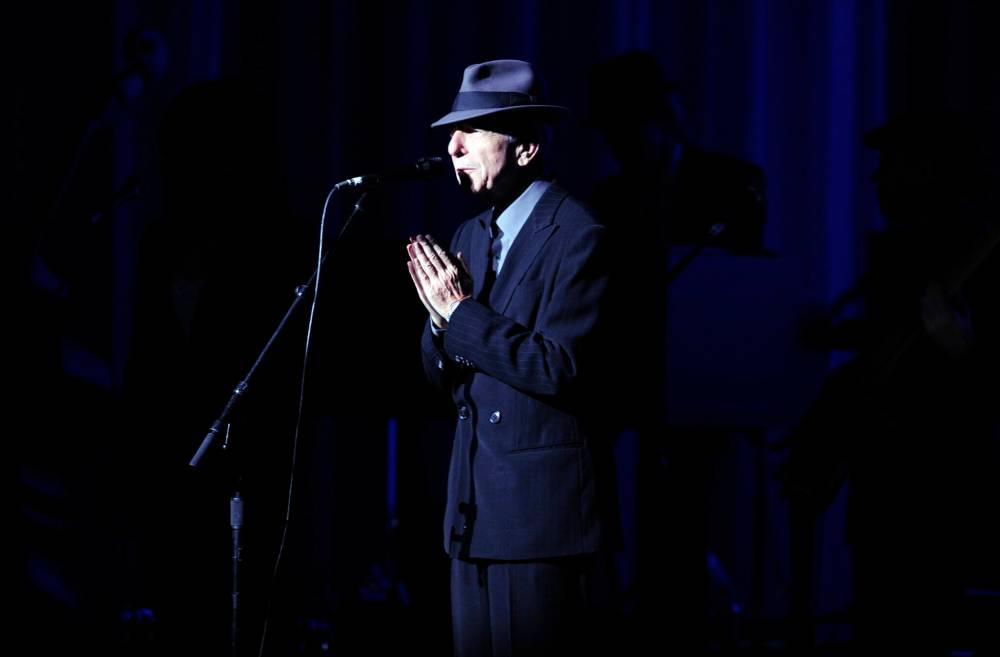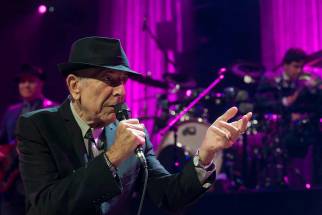Power of song Documentary gives intriguing, fragmentary portrait of Leonard Cohen through the lens of his most famous work
Read this article for free:
or
Already have an account? Log in here »
To continue reading, please subscribe:
Monthly Digital Subscription
$0 for the first 4 weeks*
- Enjoy unlimited reading on winnipegfreepress.com
- Read the E-Edition, our digital replica newspaper
- Access News Break, our award-winning app
- Play interactive puzzles
*No charge for 4 weeks then price increases to the regular rate of $19.00 plus GST every four weeks. Offer available to new and qualified returning subscribers only. Cancel any time.
Monthly Digital Subscription
$4.75/week*
- Enjoy unlimited reading on winnipegfreepress.com
- Read the E-Edition, our digital replica newspaper
- Access News Break, our award-winning app
- Play interactive puzzles
*Billed as $19 plus GST every four weeks. Cancel any time.
To continue reading, please subscribe:
Add Free Press access to your Brandon Sun subscription for only an additional
$1 for the first 4 weeks*
*Your next subscription payment will increase by $1.00 and you will be charged $16.99 plus GST for four weeks. After four weeks, your payment will increase to $23.99 plus GST every four weeks.
Read unlimited articles for free today:
or
Already have an account? Log in here »
Hey there, time traveller!
This article was published 25/08/2022 (1200 days ago), so information in it may no longer be current.
Musical biopics often end up feeling strangely similar. They tread a well-worn timeline of early struggle followed by professional success, personal breakdown and then either early death or late redemption.
Movie Review
Hallelujah: Leonard Cohen, a Journey, a Song
Directed by Daniel Geller and Dayna Goldfine
● Cinematheque, Friday until Sept. 4
● 115 minutes, PG
★★★★ out of five
Canadian icon Leonard Cohen was never a typical pop musician, though, so it seems fitting that he should get an indirect, unexpected and idiosyncratic cinematic treatment.
Documentarians Daniel Geller and Dayna Goldfine don’t set out to comprehensively cover Cohen and his music. Their approach can lack structure and focus, but it never falls into cliché, and it’s packed with intriguing analysis and affecting emotional pull.
The Montreal-born Cohen, who died in 2016 at age 82, was hard to categorize. He was a poet, a musician, a ladies’ man, a monk. Hallelujah: Leonard Cohen, a Journey, a Song is similarly hard to pin down. Built around that titular anthem, it uses the trajectory of Hallelujah to examine Cohen’s work and life (at least parts of his life).
The film also examines the music industry, with its tensions between creativity and profit, and charts the way art can change, tracking the many transformations of this one song as it moves through the world.
Geller and Goldfine follow Hallelujah from its difficult birth — scrawled draft after draft over a span of years — to Cohen’s poignant final performance of the song in 2013. They employ a mix of archival photos, video clips and talking-head interviews with critics, friends and fellow musicians to craft a thorough history of the life of the song.
Viewers shouldn’t expect a standard life of Cohen, though. There are glimpses of his privileged childhood in Montreal’s Westmount neighbourhood and some suggestions of his complicated romantic relationships, but the filmmakers approach his bio mainly in terms of how it shaped his creative process and spiritual searching.
They look at Cohen’s deep connection to Judaism and his period in a Zen Buddhist monastery. They return often to his characteristic fusion of religious questioning and erotic yearning. As Rolling Stone scribe Larry (Ratso) Sloman suggests, the influences on his songwriting process seemed to be “one part biblical and one part the woman he slept with last night.” As the film demonstrates, Hallelujah, has often been adapted by others into either solely secular or solely spiritual versions.
Aaron Harris / The Canadian Press Leonard Cohen sits for a portrait in 2006; the songwriter died in 2016 at age 82.
The song is now so beloved and ubiquitous that it might be surprising to see that it was almost buried. It wasn’t released in the U.S. until years after it was recorded because there was a new executive at Columbia Records who didn’t know what to do with Cohen’s music.
“We know you’re great, Leonard,” the man said. “But we don’t know if you’re any good.”
Still, the song had a stubborn way of sticking, and it started to move beyond Cohen’s dedicated fan base, first with a stark, pared-down version by the Velvet Underground’s John Cale and then with Jeff Buckley’s ethereal take, which gained posthumous power after that singer’s early death.
Other voices
It turns out that even with this degree of focus, two hours is insufficient, though there’s much to admire in the effort. — Dan Fienberg, Hollywood Reporter
(Hallelujah is) not a movie designed to make you feel better about anything, except perhaps Cohen himself. But this generous documentary is nonetheless likely to be a source of illumination for both die-hard and casual fans. — A.O. Scott, New York Times
It turns out that even with this degree of focus, two hours is insufficient, though there’s much to admire in the effort. — Dan Fienberg, Hollywood Reporter
(Hallelujah is) not a movie designed to make you feel better about anything, except perhaps Cohen himself. But this generous documentary is nonetheless likely to be a source of illumination for both die-hard and casual fans. — A.O. Scott, New York Times
Hallelujah isn’t a definitive, life-spanning doc on Cohen’s life, nor does it claim to be, but the tale of Hallelujah serves as a metaphor for Cohen’s life. — David Browne, Rolling Stone
It’s an interestingly stitched-together film that starts at the end and rewinds to the beginning of his songwriting career to trace how he got there. It feels, in some ways, like two different films. — Lindsey Bahr, Associated Press
… An engrossing portrait of an artist through the lens of his most famous and enduring work. — Adam Graham, Detroit News
The film delves into every aspect of Cohen’s Hallelujah — the amount of time it took to write the song, the meaning of the song, the different covers of the song, and just what did Cohen think about it. — Sarah Jane, Austin Chronicle
By focusing on the song rather than the man, the filmmakers create an arc that keeps viewers engaged. — Bridgette M. Redman, Chicago Reader
Fans of Leonard Cohen, and there are millions of them, will be enthralled by this portrait of “a kind of modern minstrel.” — David Stratton, The Australian
The big breakthrough, weirdly, came from the 2001 animated kids’ movie Shrek, with Cale’s version featured in the film and Rufus Wainwright, with his (self-described) “glorious tenor,” showcased on the monster-selling soundtrack.
That pop-culture smash fuelled a comeback, which the filmmakers track with an almost comically crammed montage of karaoke nights and American Idol/America’s Got Talent/The X Factor appearances.
The song’s status as a “modern prayer,” as one commentator calls it, is underlined by excerpts from such solemn events as NDP leader Jack Layton’s funeral and the 2021 COVID memorial in Washington, D.C.
It is perhaps Cohen’s own versions of Hallelujah that are most fascinating, though, especially in his later years. Even way back in the 1970s, Cohen had said that he “aspired to be an elder.” And, man, he was good at it. After he was defrauded of all his money at age 71, he turned that setback into an opportunity, with fresh music and a return to live performances, shown here in extensive clips that demonstrate his graciousness, his vulnerability, his wry humour.
As musician Regina Spektor suggests, it wasn’t just that Cohen was sharing his musical gifts with his audience in these concerts: It was as if he was “teaching us how to be in the world.”
One of the few frustrations with this expansive, generous film is that the music tends to come in snippets. The final tribute by k.d. lang – emotionally searing, musically soaring — made me weep. I wish there had been more.
alison.gillmor@winnipegfreepress.com

Robb D. Cohen/RobbsPhotos/Invision Files
Leonard Cohen had a late-in-life renaissance after being defrauded of his money at age 71.

Aaron Harris/The Canadian Press Files
Montreal-born Leonard Cohen was hard to categorize: poet, performer, ladies’ man, monk.

Studying at the University of Winnipeg and later Toronto’s York University, Alison Gillmor planned to become an art historian. She ended up catching the journalism bug when she started as visual arts reviewer at the Winnipeg Free Press in 1992.
Our newsroom depends on a growing audience of readers to power our journalism. If you are not a paid reader, please consider becoming a subscriber.
Our newsroom depends on its audience of readers to power our journalism. Thank you for your support.







